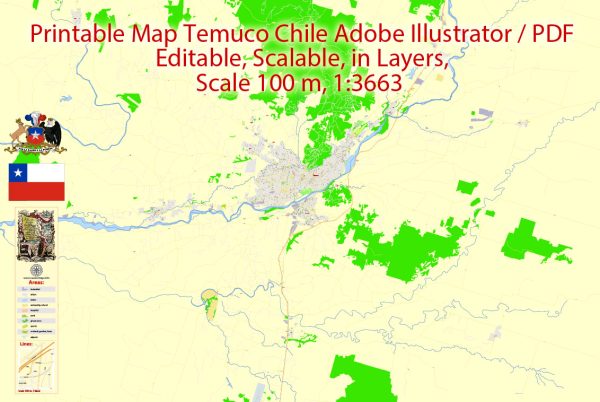Temuco is a city located in the southern part of Chile, in the Araucanía Region. It is known for its rich cultural heritage, natural beauty, and its status as a hub for the indigenous Mapuche people. Here are some key points about Temuco:
- Geography: Temuco is situated in the southern part of Chile, within the Central Valley region. It’s surrounded by lush forests, rivers, and the Andes Mountains, making it a scenic and attractive area.
- Culture: The city has a strong indigenous influence, particularly from the Mapuche culture. You can find various Mapuche crafts, cuisine, and traditions throughout the city. There are also cultural events and festivals that celebrate the Mapuche heritage.
- Education: Temuco is home to several universities and higher education institutions, making it an important educational center in southern Chile.
- Economy: The city’s economy is diverse, with sectors like agriculture, forestry, and tourism playing a significant role. The surrounding region is known for its agriculture, including the production of fruits, grains, and timber.
- Tourism: Temuco is a gateway to many outdoor recreational activities. It’s close to national parks, lakes, and hot springs, making it a popular destination for nature enthusiasts. The Villarrica Volcano and Lake Villarrica are nearby and are popular attractions for hiking, skiing, and water sports.
- Transportation: The city is well-connected by road and air. The La Araucanía International Airport is the main gateway for air travel, and there are good bus and train connections to other parts of Chile.
- History: The city has a rich history, with the arrival of Spanish colonists in the 19th century and later becoming an important center for Chilean settlers. The Mapuche people have a long history in the region and have influenced the culture and identity of the city.
Overall, Temuco is a city that blends modern urban life with a strong connection to its indigenous roots and natural beauty. It offers a unique experience for travelers and those interested in exploring the history and culture of southern Chile.


 Author: Kirill Shrayber, Ph.D. FRGS
Author: Kirill Shrayber, Ph.D. FRGS